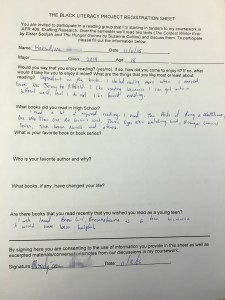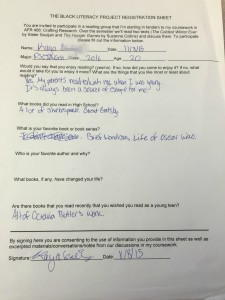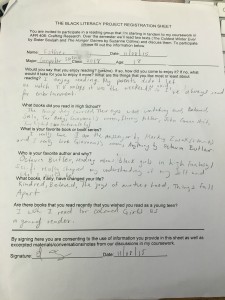The Process
This page is dedicated to the process of progress for this project. Here I will post excerpts from brainstorm sessions, proposals, even recordings of my actual book club meetings so that you can come along with me on this exploratory journey.
11.4.15
Take a look at my project proposal! Here I extensively outline what I’m investigating in this literary project and how.
The Black Literacy Project
Research Question
How do our environments inform what young black women, at Williams College, read and how they perceive blackness in the Young Adult literary canon?
Background and Significance
Being an English major with a passionate (and at times questionable) love of young adult (YA) novels, I decided to center my final project on teen readership, specifically black female readership. Aside from the obvious issues of lack of black representation in the genre, I had questions about how black teens are reading these texts, and what they’re reading.
When I reflect on my teenage years, most of the stories I remembered reading and loving were supernatural, sci-fi, and were very white. This wasn’t to say that I didn’t read any Morrison and the like, but my heart lead me to the young adult book store without fail. However as I read deeper into the genre, I noticed that in the young adult section most of the novels that were authored by black writers were stories of tragedy. These tragedies were not those of Nicholas Sparks-esque teenage folly. They were neither romance gone awry nor adventure epics with the world hanging in the balance. These were grim narratives determined and informed by, in my perception, the main character’s race. It was a reality that my teenaged self was unwillingly to face.
The young adult black literary cannon, past and present, has an oversaturation of stories centered on gang violence, dismal ghetto life, historical fictions that span anywhere from slavery to the Civil Rights Movement, or some tragedy stationed in an ambiguous Africa. Though there are excellent exceptions to the rule, such as Sharon Draper’s body of work, I found the limited scope for black teens disappointing. I recognized that these stories being told were necessary to our literary canon, as they are a part of the black experience, but I hungered for narratives of that existed outside the continuum of suffering. I wanted novels about black teens being black teens. In my time as a young adult, I maybe came across two books that had main characters of color doing “normal” teen things or were in fantasy worlds. So, with no solution in sight I continuedto read fantastical novels.
But when I look back I wonder to myself was that really it? Was it because I couldn’t find black fantasy or was it because my environment was predominately white? I wanted to be able to relate with my friends in school and read what they read, and they weren’t reading Octavia Butler, Junot Diaz, Sharon Draper, Walter Dean Myers, or even Sister Souljah. My mom was the one who introduced The Coldest Winter Ever, the novel that spawned street literature, as we know it and rocked almost every black girl’s world but mine, to me. My church friends and Del-Teens group[1] (read: my black girl friends) loved the novel, yet I couldn’t even finish it. I hated it and I felt defective for it. I wondered why I could relate or at least sympathize with characters who time traveled, started revolutions, or saw ghosts, but couldn’t find it in myself to even like the main character Winter Santiaga. So this served as a driving force for my project. “How does predominately white environments (in academia) effect black female readership?”
Together with Professor Manigault-Bryant, I formulated the idea of a book club that would be primarily comprised of underclassmen at Williams to read The Coldest Winter Ever and The Hunger Games to see how black women are reading blackness and alternatively whiteness in these novels.
This work is ultimately important to the field of Africana studies because young adult literature is a site of latent race and gender theory that, for the betterment or detriment of the genre, is highly accessible. Books, falling into two categories which I affectionately call mirrors of life experience or windows out to alternate realities, carry our imbedded racial, sexual, gender, and class politics no matter the genre. Under the guise of entertainment, inclusive spaces, and literary worlds that allow for a reimagined self, these books, often unconscientiously, and sometimes insidiously, color young adults’ worldview with the biases of the author and publishers. Uncovering and deconstructing the ways these biases are interjected into YA novels in a way that is considerate to teens, and not academically alienating, we can sooner dismantle the literary politic of hegemony. The power to name, to define with the pen can be wielded in a healthier manner, by first understanding how these novels are actually being received amongst teens. We need to go beyond mere ‘representation’ and make the young adult novel radical again for marginalized people, not just another site of oppression. Ultimately the Africana Studies field is about analyzing the nexus of history, academics, and the political and the personal for African diasporic peoples; what can possibly be more personal the imagined world we create for ourselves when we read novels? The YA novel is a significant fixture of childhood that should be analyzed as a text of theory, because after all theory is an abstracted ideal, a guide to understanding the world around us that is constantly disrupted by our realities. [2]
11.9.15
So this Sunday marks two weeks of the book club, and its going well (for the most part). Currently we’re working with The Coldest Winter Ever by Sister Souljah, a controversial text to say the least. Here’s an excerpt of our very first discussion:
BCBG (Book Club for Black Girls): Session One
In our conversation, the girls have picked up on the themes I have been toying with in my research: the effect of environment in reading, how black womanhood is construed in YA lit and literature in general, the type of characters they would like to see. I talk a lot this first session (because most of them didn’t get a chance to read the book yet) but the members mostly drive this question of what type of black girl they would like to see in books.
This group is thoughtful and approach the text and topic of discussion with relish, which I appreciate. They’re nerds just like me, and I don’t know how this project would be formed if I had someone who disliked reading. This makes me wonder once again if my research will unknowingly have an implicit bias, but once again this research is on the women here at this institution in this particular project….
Anyways all this is to say, this is where we’re at now, and I’m enjoying it.
12.8.15
This is a sample of the questionnaire/registration sheet I gave my participants upon their arrival to the first book club session. To both get a sense of the type of readers my participants were and the reading environments they grew up in, I asked these questions:
THE BLACK LITERACY PROJECT REGISTRATION SHEET
You are invited to participate in a reading group that I’m starting in tandem to my coursework in AFR 406: Crafting Research. Over the semester we’ll read two texts (The Coldest Winter Ever by Sister Souljah and The Hunger Games by Suzanne Collins) and discuss them. To participate please fill out the information below.
Name: Date: .
Major: Class: Age: .
Would you say that you enjoy reading? (yes/no). If so, how did you come to enjoy it? If no, what would it take for you to enjoy it more? What are the things that you like most or least about reading?
What books did you read in High School?
What is your favorite book or book series?
Who is your favorite author and why?
What books, if any, have changed your life?
Are there books that you read recently that you wished you read as a young teen?
—————————————————————————————————————-
By signing here you are consenting to the use of information you provide in this sheet as well as excerpted materials/conversations/notes from our discussions in my coursework.
Signature: Date: .
From these questions I hope to draw out their natural inclination to either fantasy novels, novels that take one outside of their known world, or realistic novels that depict a mirror of blackness for young readers.
12.8.15
Earlier I described the registration sheets that I handed out to my participants, here’s the actual thing!


